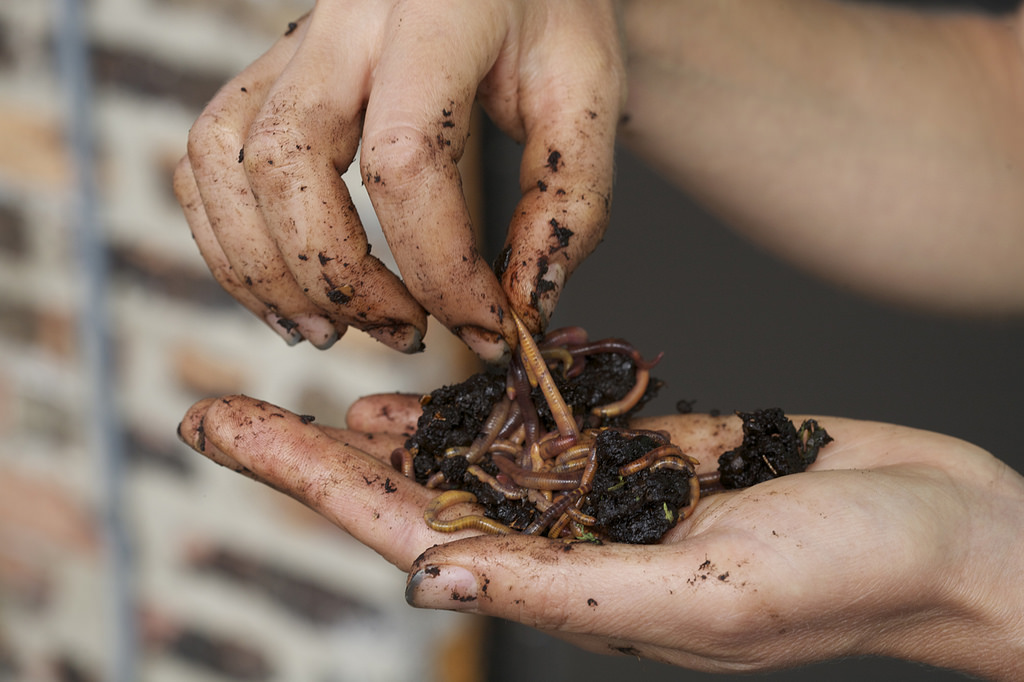Basic Guidelines About Composting And Worm-Farming
Are you interested in being a ShareWaste host or donor but don’t know much about composting or worm-farming? We’ve put together an infosheet with some basic guidelines and tips. Individual cases may vary so if you are a donor, always check with your host what they can accept and how much.
And now, please welcome to the wonderful world of organic recycling and closing the food loop.
Traditional compost
WHAT?
Compost is organic matter that enriches soil and is a great fertiliser for vegetable patches and gardens.
HOW?
A basic compost is simply a combination of food scraps, dry organic material, air, and time. For organic matter to turn into compost effectively, it needs a healthy balance* of:
GREEN MATERIALS that are rich in nitrogen. These include food scraps and freshly-picked garden weeds and plants. Avoid adding meat, dairy, and cooked foods to your compost. Depending on your soil, citrus and onions might be fine or inappropriate. In most cases, a moderate amount of citrus is a-okay.
BROWN MATERIALS that are rich in carbon. These include dry leaves (shredded ones are better), straw, eggshells, sawdust (only non-treated wood) and newspaper.
AIR! Oxygen is a key ingredient in any good compost, so a compost heap needs aeration regularly. This might mean turning your heap with a spade or garden fork, spinning your compost if it’s in a rotating container, or using a compost aerator (a hollow pole, with holes drilled into it, in the middle of your compost). Aeration is really important because without it the organic materials won’t decompose properly and will start to rot, producing methane.
TIME. Compost can take anywhere from 6 weeks–6 months depending on the temperature (the hotter, the faster), the composition of organic material, and the type of system you have.
*The typical suggestion is 2 parts GREEN: 1 part BROWN, but 1:1 can work too. It depends on your compost, so experiment with these ratios to see what works best for your own compost.
Compost can simply be a humble heap of green and brown layers, but you can also use an enclosed bin or a compost-specific container. There are many containers available online and in gardening and hardware stores. Check with your Council for special offers, discounts and composting programs.
WHY?
When food scraps go into landfill, they rot and start producing methane, which is a potent greenhouse gas. As they decompose in landfill, they also combine with heavy metals, chemicals and non-decomposable suspended solids to produce leachate, a toxic sludge that pollutes proximate aquatic and terrestrial ecosystems. By composting food scraps, these nasty environmental impacts are avoided, and the planet is happier.
Also, compost is a free fertiliser for your garden! Why not?
WHERE?
Compost heaps should be in a well-drained, shady spot. Not too much water, not too much sun! Put fine wire under the compost bin to keep out rodents.
WHEN?
You can compost year-round, but the composting process will happen fastest in the warmer months.
Vermicompost

WHAT?
Vermicompost is the product of using worms to process organic material. The process of vermicomposting produces vermicast, a nutrient-rich soil-like substance that can be harvested every 4-6 months and applied to garden beds, and worm wee, which is produced more rapidly and can be diluted and used as a liquid fertiliser. Vermicomposting worms aren’t your everyday earthworms–so you can’t pluck them out of the garden and try and start a worm farm. You need specific composting worms–usually ‘red wigglers’ are used.
HOW?
Worm farms are readily available from your local hardware or gardening store, or you can DIY. A typical household worm farm will have three levels–the middle level, where the worms start out as the worm farm is getting established; the bottom level, where the worm wee accumulates; and the top level, where the worms will migrate to once the farm is established. The top level is where you put the food scraps–about a handful every two days is a good amount for 1000 worms. Worms are picky eaters, so don’t put meat, dairy, garlic, onion, chilli or citrus in your worm farm. For all other scraps, cut or shred them so they’re easier for the worms to ingest.
WHY?
Worm farming is great alternative to organics recycling for those who don’t have enough room for a conventional compost heap, or who are looking for a stronger fertiliser.
WHERE?
Worm farms are suitable for both inside and outside as long as they're kept in a cool, shaded area. The worms love moisture (but not too much!) so ensure that the moisture is at about 75%, or the same as damp soil. This will probably mean giving the worm farm a water every week or so. At the same time, improperly drained worm farms will start to produce an odour, so make sure yours is properly equipped to drain through the bottom of the worm farm.
WHEN?
Year-round! However, worms like cool, damp conditions, so in summer take extra care that your vermicompost system is moist and shaded. We’ve heard many stories of cooked worms.
Are you interested in being a ShareWaste host or donor but don’t know much about composting, worm-farming or keeping chickens? We’ve put together an infosheet with some basic guidelines and tips. Individual cases may vary so if you are a donor, always check with your host what they can accept and how much.
And now, please welcome to the wonderful world of organic recycling and closing the food loop.
Written by Rebecca DeCourcy